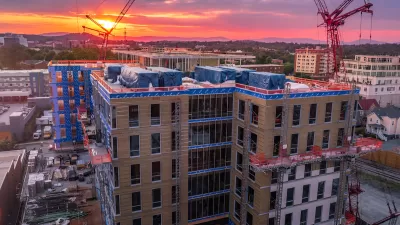Despite new construction, Miami homes remain stubbornly expensive. An opinion piece for Next City makes the case for community land trusts as a solution.

Miami has built a number of impressive skyscrapers, but the changing skyline and growing capacity has not translated into a lot of affordable housing. "According to data from the Florida International University Metropolitan Center’s Miami-Dade Prosperity Initiative study, 61 percent of Miami-Dade County renters and 42 percent of homeowners are paying more than 30 percent of their income on housing – making this one of the most unaffordable housing markets in the United States," writes Mandy Bartle. Miami's property market has a number of buyers from within and without the city limits. "Every year, we lose homes that were once affordable to working-class families as they are redeveloped as luxury homes or simply consumed by the surrounding market," Bartle contends.
Bartle's opinion piece argues that nonprofits and government agencies need to make sure they own land so that they can keep it affordable in perpetuity: "The community land trust model preserves permanent affordability by separating the ownership of land from the home that sits on it; the community retains ownership of the land, and homes are sold (or at times rented) to individuals at an affordable price."
FULL STORY: What Miami’s Skyline Could Mean for All of Miami’s Residents

Alabama: Trump Terminates Settlements for Black Communities Harmed By Raw Sewage
Trump deemed the landmark civil rights agreement “illegal DEI and environmental justice policy.”

Study: Maui’s Plan to Convert Vacation Rentals to Long-Term Housing Could Cause Nearly $1 Billion Economic Loss
The plan would reduce visitor accommodation by 25% resulting in 1,900 jobs lost.

Planetizen Federal Action Tracker
A weekly monitor of how Trump’s orders and actions are impacting planners and planning in America.

Wind Energy on the Rise Despite Federal Policy Reversal
The Trump administration is revoking federal support for renewable energy, but demand for new projects continues unabated.

Passengers Flock to Caltrain After Electrification
The new electric trains are running faster and more reliably, leading to strong ridership growth on the Bay Area rail system.

Texas Churches Rally Behind ‘Yes in God’s Back Yard’ Legislation
Religious leaders want the state to reduce zoning regulations to streamline leasing church-owned land to housing developers.
Urban Design for Planners 1: Software Tools
This six-course series explores essential urban design concepts using open source software and equips planners with the tools they need to participate fully in the urban design process.
Planning for Universal Design
Learn the tools for implementing Universal Design in planning regulations.
Caltrans
Smith Gee Studio
Institute for Housing and Urban Development Studies (IHS)
City of Grandview
Harvard GSD Executive Education
Toledo-Lucas County Plan Commissions
Salt Lake City
NYU Wagner Graduate School of Public Service





























